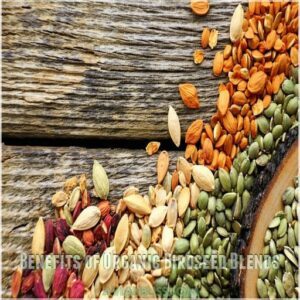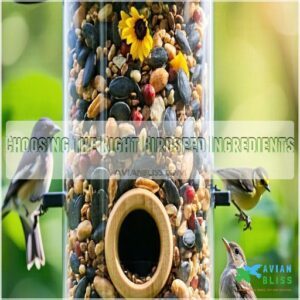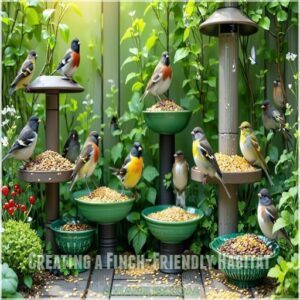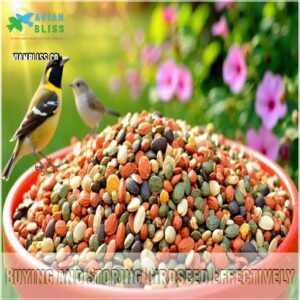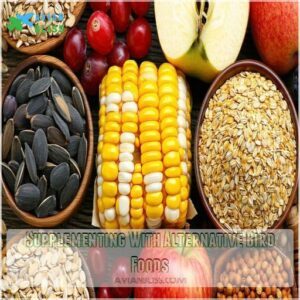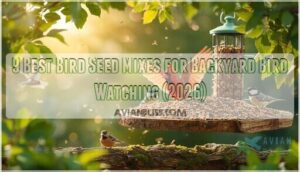This site is supported by our readers. We may earn a commission, at no cost to you, if you purchase through links.

These nutrient-packed mixes minimize pesticide exposure and offer birds a buffet of energy-rich seeds like black oil sunflower, nyjer, and safflower.
By choosing certified organic options, you’re not just feeding birds—you’re creating a sustainable ecosystem.
Strategically place your feeders near protective shrubs, mix seed varieties for maximum appeal, and watch as finches, sparrows, and other feathered friends flock to your yard. Pro tip: rotate your seeds every few months to keep them fresh and prevent mold.
Table Of Contents
- Key Takeaways
- Benefits of Organic Birdseed Blends
- Choosing The Right Birdseed Ingredients
- Creating a Finch-Friendly Habitat
- Buying and Storing Birdseed Effectively
- Supplementing With Alternative Bird Foods
- Frequently Asked Questions (FAQs)
- What is the healthiest bird seed?
- What is the best seed mix for garden birds?
- What can I mix with bird seed to keep squirrels away?
- Can you make your own bird seed mix?
- How often should I replace my birdseed mix?
- Can birds get sick from old seeds?
- Why do some birds ignore feeders?
- Are homemade birdseed blends cost-effective?
- What prevents seeds from spoiling quickly?
- Conclusion
Key Takeaways
- Choose certified organic birdseed blends like black oil sunflower, nyjer, and safflower to give birds a nutrient-packed, pesticide-free feast.
- Rotate seeds regularly and store them in airtight containers to keep them fresh and mold-free for your feathered friends.
- Place feeders near shrubs or use squirrel-proof feeders to create a safe and inviting habitat while keeping pests away.
- Enhance your bird-feeding setup with suet, peanuts, fresh fruits, and water sources to attract a wider range of bird species.
Benefits of Organic Birdseed Blends
If you’re passionate about supporting local wildlife while ensuring your feathered friends receive superior nutrition, organic birdseed blends are your golden ticket to a thriving backyard ecosystem.
These carefully crafted seed mixtures minimize pesticide exposure.
They provide a sustainable, nutrient-rich feast that’ll have wild birds flocking to your garden with gusto.
Environmental Conservation
By choosing organic birdseed, you’re not just feeding birds – you’re casting a lifeline for entire ecosystems.
Sustainable sourcing directly combats habitat loss, protecting wildlife welfare through mindful consumption.
Every seed purchase becomes a vote for environmental sustainability, reducing pesticide impact and supporting eco-friendly farming practices that nurture biodiversity and help wild bird populations thrive.
You can find a variety of certified best organic options to support these eco-friendly efforts.
High-Quality Seed Options
Protecting our feathered friends starts with exceptional organic birdseed blends that pack a nutritional punch.
For superior seed options, consider these expert tips:
- Look for organic certification
- Check seed blend ratios carefully
- Prioritize non-GMO sourcing
- Consider a balanced diet rich in nyjer, millet, and other essential nutrients
Selecting the right seeds means happier, healthier birds that’ll transform your backyard into a wildlife paradise. Your winged buddies will thank you with vibrant songs and endless energy!
Choosing The Right Birdseed Ingredients
For attracting wild birds to your backyard, you’ll want to select birdseed ingredients that are both nutritious and irresistible to your feathered friends.
By understanding the unique preferences of different bird species and choosing high-quality organic seeds like black oil sunflower, nyjer, safflower, and millet, you’ll create a feast.
This feast will have birds flocking to your feeders in no time.
Black Oil Sunflower Seeds
The tiny kernels tucked inside black oil sunflower seeds pack a nutritional punch that wild birds can’t resist. These premium organic sunflower seeds offer unparalleled energy content and superior seed sourcing for feathered friends.
For the best results, purchase from reputable retailers like organic black oil sunflower seeds suppliers.
| Seed Characteristic | Bird Benefits |
|---|---|
| Thin Shell | Easy Cracking |
| High Fat Content | Energy Boost |
| Organic Sourcing | Nutritional Purity |
| Dark Color | Attracts More Species |
| Compact Size | Perfect Feeding |
Storage matters: keep these golden nuggets dry and cool to maintain maximum nutritional value.
Nyjer Seeds
Moving from sunflower seeds, nyjer seeds are a finch’s favorite tiny treasure. These lightweight, nutrient-dense seeds pack a punch for your feathered friends.
- Incredibly high-energy nutrition
- Attracts multiple finch species instantly
- Ultra-lightweight for easy seed dispersal
- Perfect for specialized tube feeders
Sourcing organic, pesticide-free nyjer seeds guarantees your backyard birds get premium fuel for their adventures.
Safflower Seeds
Craving a secret weapon in your birdseed arsenal? Safflower seeds pack a white, distinctive punch that’ll make your feathered friends chirp with joy while keeping pesky squirrels at bay.
These organic, nutrient-rich gems offer a unique deterrent effect, boasting a flavor that most unwanted visitors find unappealing.
Safflower seeds are particularly notable for their high vitamin E content rich in vitamin E and fatty acids.
Smart bird enthusiasts know safflower seeds are a game-changer in organic birdseed blends.
Millet and Other Seed Options
In terms of millet, you’ve got a rainbow of varieties that can turn your birdseed blend into a nutritional jackpot.
White, red, and golden millet offer different textures that finches can’t resist.
Choose organic millet to provide high-quality feed and minimize pesticide exposure.
Pro tip: Mix these seed varieties strategically to create a diverse, irresistible buffet for your feathered friends.
Creating a Finch-Friendly Habitat
If you want to transform your backyard into a finch paradise, strategic habitat design is your golden ticket to attracting these delightful feathered friends.
Create an inviting sanctuary by positioning tube feeders near protective shrubs.
Scattering organic nyjer and sunflower seed blends on platform feeders is also beneficial.
Providing shallow water sources that’ll make finches tweet with joy is crucial.
Strategic Feeder Placement
After selecting high-quality birdseed blends, your feeder placement becomes your secret weapon for attracting backyard birds. Strategic positioning can make or break your bird-watching success.
Consider these pro tips:
- Mount bird feeders at varying heights to accommodate different species.
- When choosing a feeder, consider durable, weather-resistant materials like those found in the best finch feeders (best finch feeders) to minimize maintenance and provide your birds with a safe haven.
- Keep feeders 10-12 feet from protective shrubs for quick escape routes.
- Space multiple feeders to reduce territorial conflicts and provide safe feeding zones.
Shrub and Native Plant Selection
When you’ve lined up those perfect bird feeders, it’s time to level up your backyard bird sanctuary with smart shrub selection. Native plants aren’t just pretty – they’re a buffet and hotel for your feathered friends.
Consider incorporating an organic mix that’s 70% certified organic spring barley, a cereal crop that’s great for wild birds, like this wild bird seed mix.
Check out this quick guide to transforming your outdoor space into a finch paradise:
| Plant Type | Bird Attraction | Regional Suitability |
|---|---|---|
| Sunflowers | High | Most North American regions |
| Native Grasses | Moderate | Climate-specific zones |
| Berry Bushes | High | Varied ecosystems |
| Seed-Producing Perennials | Moderate | Local microclimates |
Water Sources and Squirrel Deterrents
Want to keep your feathered friends hydrated and your birdseed safe from furry bandits? Your shrub-lined garden now needs smart water sources and squirrel deterrents.
Check out these game-changing strategies:
- Install shallow ceramic finch waterers near feeders
- Use squirrel guards on tube and platform feeders
- Position water sources away from predator hiding spots
- Scatter seeds strategically to minimize ground feeding risks
Buying and Storing Birdseed Effectively
When you’re on the hunt for the perfect birdseed, understanding how to buy and store it can make all the difference for your feathered friends.
You’ll want to focus on seed freshness, brand reputation, and proper storage techniques.
to help your backyard birds get the highest-quality, nutrient-packed meal possible.
Seed Purity and Freshness
After crafting the perfect finch habitat, you’ll want to zero in on seed quality.
Seed purity isn’t just a buzzword—it’s your birds’ lifeline. High-quality organic birdseed blends demand careful testing and pristine storage.
Protect your feathered friends from potential contaminants by mastering seed selection and preservation techniques that keep your backyard buffet fresh and safe.
| Seed Test | Freshness Indicator | Action |
|---|---|---|
| Visual Inspection | No discoloration | Keep |
| Moisture Check | Completely dry | Discard if damp |
| Smell Test | Clean, neutral odor | Store properly |
| Mold Screening | No clumping/white patches | Reject immediately |
| Expiration Date | Within recommended period | Replace if expired |
Brand Reputation and Cost
When hunting for the best organic birdseed blends, smart shoppers compare brand reputations against price tags.
Wagner’s and Lyric top the charts for premium quality, while budget-conscious bird lovers can snag solid value with brands like Shafer.
Your wallet doesn’t have to take flight—compare long-term savings and nutritional content to make a savvy seed investment.
Choosing the right birdseed can be overwhelming, but considering the relationship between bird bill shapes and seed sizes will help you make a more informed decision.
Storage Containers and Handling
Smart bird lovers know airtight containers are your secret weapon for preserving organic birdseed blends.
Choose food-grade plastic or metal containers with tight-sealing lids to lock out moisture and pests.
Store your birdseed in a cool, dry place away from direct sunlight.
Keep containers clean, inspect regularly for signs of mold, and replace seeds every 3-6 months to maintain peak freshness and nutrition.
Supplementing With Alternative Bird Foods
If you’re looking to supercharge your backyard bird feeding strategy, you’ll want to explore beyond traditional seed mixes.
Discover a world of alternative nutritional powerhouses.
Whether it’s protein-packed mealworms, energy-rich suet cakes, or sweet seasonal fruits, these alternative bird foods can transform your feathered friends’ diet.
And keep them healthy, happy, and coming back for more.
Suet and Seed Cakes
After mastering seed storage, you’ll want to level up your bird feeding game with suet and seed cakes.
These protein-packed energy bombs attract woodpeckers, chickadees, and nuthatches like moths to a flame.
Homemade suet recipes blend rendered fat with seeds, nuts, and fruits, creating irresistible organic bird food that’ll make your backyard a wildlife hotspot.
Homemade suet can be a cost-effective option, allowing for customization of ingredients and providing high energy boost, especially beneficial in cold weather.
Peanuts and Mealworms
Two powerhouse foods can supercharge your backyard bird buffet: peanuts and mealworms.
These protein-packed treats attract diverse bird species like woodpeckers and robins, offering essential nutrients beyond traditional organic birdseed blends.
When sourcing, prioritize human-grade, unsalted options.
Consider choosing bird seed mixes from suppliers who source high-quality ingredients.
Pro tip: mix mealworms with bark butter or scatter peanuts near native shrubs to create an irresistible bird dining experience.
Fresh Fruits and Healthy Treats
Got hooked on mealworms? Level up your feathered friends’ snack game with fresh fruits.
Slice organic berries, chopped apples, or seedless grapes into bite-sized pieces. Avoid toxic fruits like avocado and cherry pits.
Consider what types of fruit for birds are suitable to support a balanced diet.
Scatter fruit treats sparingly near platform feeders, making certain quick consumption to prevent spoilage.
Remember: moderation is key in your seasonal, organic birdseed blend strategy.
Frequently Asked Questions (FAQs)
What is the healthiest bird seed?
You’ll want black oil sunflower seeds as the healthiest choice. They’re packed with energy, thin-shelled, and attract finches.
Mix in nyjer and safflower seeds for a nutrient-rich blend.
That’ll keep your feathered friends chirping with health and vigor.
What is the best seed mix for garden birds?
Did you know over 40 bird species visit backyard feeders?
Your best seed mix combines black oil sunflower seeds, nyjer, and white millet to attract diverse feathered friends.
Providing essential nutrition for their vibrant garden ecosystem.
What can I mix with bird seed to keep squirrels away?
Add safflower seeds to your bird mix – squirrels can’t stand them!
Sprinkle cayenne pepper sparingly
or invest in squirrel-proof feeders with weight-activated perches that close when heavier critters attempt to feast.
Can you make your own bird seed mix?
Like a chef crafting a signature dish, you can mix your own bird seed blend.
By combining black oil sunflower seeds, nyjer, millet, and safflower.
In precise proportions to attract diverse finch species and provide the best possible nutrition.
How often should I replace my birdseed mix?
Replace your birdseed mix every two weeks to prevent spoilage, mold, and bacterial growth.
Check for moisture, clumping, or foul odors.
Store seeds in cool, dry places and clean feeders regularly to maintain bird health and attract more feathered friends.
Can birds get sick from old seeds?
Yes, old seeds can harbor harmful bacteria and mold that’ll make birds sick.
Check your birdseed’s freshness monthly, store in airtight containers, and toss any moldy, clumpy, or musty-smelling seeds to protect your feathered friends’ health.
Why do some birds ignore feeders?
Birds might snub your feeders if they’re uncomfortable with placement, seed quality, or nearby threats.
Check your feeder’s location, use fresh seeds, and create a safe environment.
To attract more feathered friends, mimic their natural habitat.
Are homemade birdseed blends cost-effective?
Mixing your own birdseed can save money, especially if you buy ingredients like black oil sunflower and millet in bulk.
You’ll control the quality, avoid fillers, and customize blends to attract specific birds.
What prevents seeds from spoiling quickly?
Store seeds in airtight containers to block moisture and pests.
Keep them in a cool, dark place, like a closet or pantry.
Avoid buying too much at once—fresh seeds stay mold-free and nutrient-rich longer.
Conclusion
Imagine a lonely finch, wings drooping from exhaustion, suddenly finding your feeder brimming with organic birdseed blends.
That’s the difference you’re making—supporting wildlife while protecting the planet.
With high-quality seeds like nyjer and safflower, paired with smart feeder placement and squirrel deterrents, you’re building a vibrant backyard haven.
So keep it fresh, mix up seed varieties, and enjoy the flurry of life your efforts bring. Happy birdwatching—you’re officially their favorite caterer!
- http://www.thebirdfoodstore.com/2013/09/06/millet-is-good-milo-is-bad/
- http://birding.about.com/od/birdfeeders/a/How-To-Choose-Birdseed.htm
- http://www.birdchannel.com/wild-bird/wild-bird-news/bad-weeds-sprout-from-birdseed-feeders.aspx
- https://www.popsci.com/science/wild-birds-dont-rely-on-feeders/
- http://www.a2a2/

